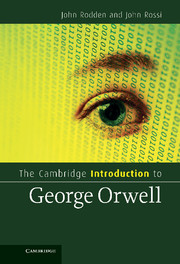Chapter 3 - Critical reception
Published online by Cambridge University Press: 05 August 2012
Summary
Starting out in the 1930s
Orwell’s reputation as a writer in literary London began modestly. The period 1928–32 represents the writer’s five years of struggle as “Eric Blair.” Eager to find journalistic and reviewing assignments on his return from Burma in December 1927, he soon became a regular contributor to newspapers and magazines such as the New English Weekly and Adelphi. Scraps of biographical evidence and letters referring to lost stories with titles such as “The Sea God” and “The Man with Kid Gloves” suggest that Orwell was writing descriptive fiction (somewhat along the lines of what would later become Burmese Days). He wrote two novels during this time, both of which so displeased him that he destroyed them. These years witnessed only one effort of more than biographical interest, the superb, apparently autobiographical essay, “A Hanging” (1931). Yet for Etonian Orwell this was nonetheless a time of decisive déclassé experience, much of which he recast in later publications (e.g., his hop-picking and school teaching in A Clergyman’s Daughter, and his two weeks in a Paris hospital in “How the Poor Die”).
A larger work – a curious pastiche of novel, memoir, essay, and reportage – also emerged from his descent into the underworld of the transients and urban poor. Working as a plongeur in Paris and tramping throughout southern England, he drafted a manuscript that became his first book, Down and Out in Paris and London. Uncertain about its reception and anxious about how any publicity about his transient life might be received by his family, he considered at least four pen names, finally telling his publisher, Victor Gollancz, that he “rather preferred George Orwell.”
- Type
- Chapter
- Information
- The Cambridge Introduction to George Orwell , pp. 86 - 114Publisher: Cambridge University PressPrint publication year: 2012



